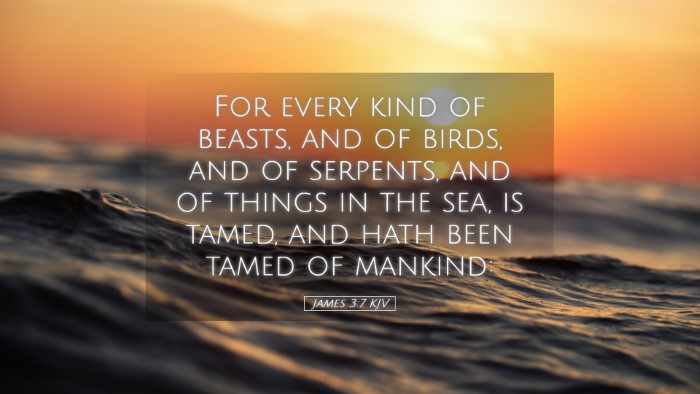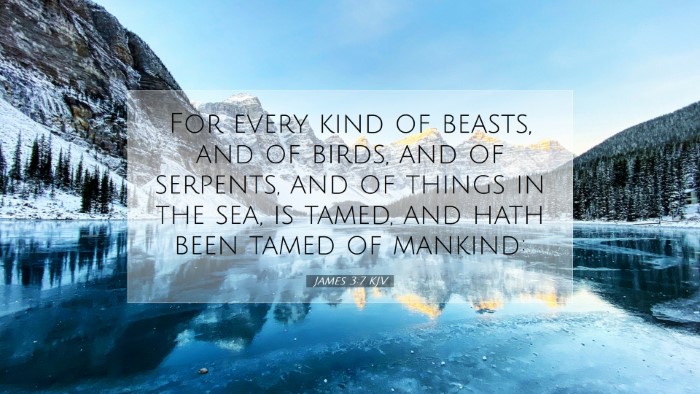Old Testament
Genesis Exodus Leviticus Numbers Deuteronomy Joshua Judges Ruth 1 Samuel 2 Samuel 1 Kings 2 Kings 1 Chronicles 2 Chronicles Ezra Nehemiah Esther Job Psalms Proverbs Ecclesiastes Song of Solomon Isaiah Jeremiah Lamentations Ezekiel Daniel Hosea Joel Amos Obadiah Jonah Micah Nahum Habakkuk Zephaniah Haggai Zechariah MalachiJames 3:7
James 3:7 KJV
For every kind of beasts, and of birds, and of serpents, and of things in the sea, is tamed, and hath been tamed of mankind:
James 3:7 Bible Commentary
Commentary on James 3:7
Bible Verse: James 3:7 - "For every kind of beast and of birds, and of serpents, and of things in the sea, is tamed, and hath been tamed of mankind:"
Introduction
The epistle of James, characterized by its practical wisdom and ethical teachings, offers profound insights into the nature of human speech and the power of the tongue. In this verse, James contrasts the ability of humankind to tame various creatures with the struggle to control the tongue. This commentary draws insights from notable public domain commentators such as Matthew Henry, Albert Barnes, and Adam Clarke.
The Power of the Tongue
In James 3:7, the author emphasizes that while humanity can tame a multitude of creatures, there is a troubling limitation when it comes to controlling the tongue. This dichotomy serves to highlight the intrinsic challenges of human nature and the inherent dangers of speech.
Insights from Matthew Henry
Matthew Henry notes that the verse illustrates the mastery that man has achieved over the animal kingdom, including "beasts, birds, serpents, and creatures of the sea." This point speaks to God's creation and the dominion that humans have been granted (Genesis 1:26). However, the transition to discussing the tongue reveals a grave inconsistency, as Henry elaborates:
- Understanding Human Limitations: Despite humanity’s accomplishments in taming animals, the tongue remains untamed, suggesting a deeper spiritual issue within mankind.
- The Nature of the Tongue: The tongue, capable of great good and profound evil, poses a challenge to believers that requires vigilance and self-control.
Insights from Albert Barnes
Albert Barnes provides a further elucidation on the implications of taming animals compared to the tongue's untamed nature. He posits that:
- The Contrast of Control: Barnes emphasizes that while people can master fearsome animals, the tongue can inflict harm that is far greater and more damaging.
- The Spiritual Dimension: He points out that this struggle with the tongue is emblematic of a person's spiritual state, reflecting the necessity of divine assistance for transformation.
Insights from Adam Clarke
Adam Clarke, known for his extensive biblical exposition, adds nuance to the understanding of this verse by considering the implications of speech:
- Symbolism of Beasts: Clarke interprets the diverse animals mentioned as symbols of different human vices and behaviors that can also be tamed, yet the tongue remains a unique challenge.
- Call for Responsibility: He underscores the responsibility placed on believers to manage their speech wisely, as it reflects one’s character and influences the community.
Applications for Believers
This verse serves as a rallying point for believers, encouraging them to reflect on their use of words. The ability to tame external beasts is commendable, yet the internal battle of controlling the tongue is of paramount importance.
- Self-Examination: Believers are called to examine their speech patterns and consider the impact of their words on others.
- Seeking Divine Help: It reminds us that reliance on God is essential in overcoming the natural inclinations of harsh speech.
- Building Community: Constructive and loving speech fosters unity in the body of Christ, highlighting the significance of words in personal and communal witness.
Conclusion
James 3:7 poignantly illustrates the paradox of human dominion over creation contrasted with the struggle against the untamed tongue. Through the insights of Matthew Henry, Albert Barnes, and Adam Clarke, we are led to a deeper understanding of our responsibility as stewards of speech. As we navigate our daily interactions, let us remember that our words possess the power to build up or tear down, and let us seek the wisdom and strength from God to lead lives marked by careful and compassionate speech.


